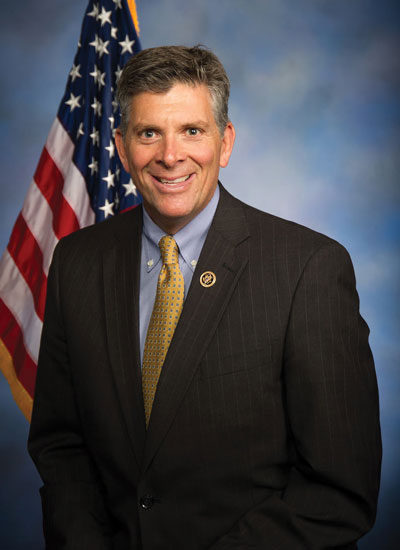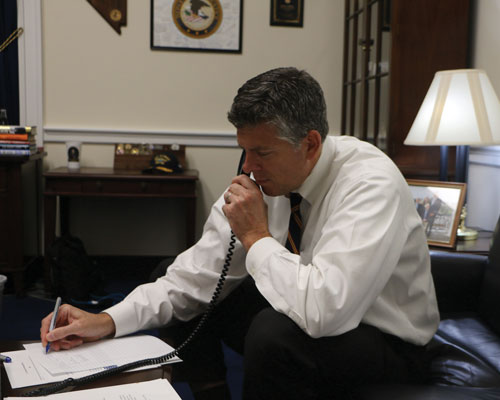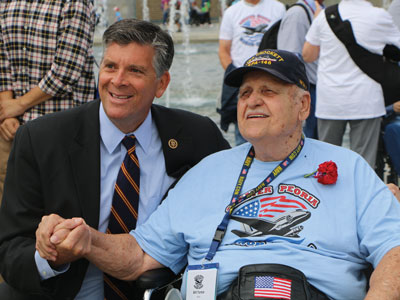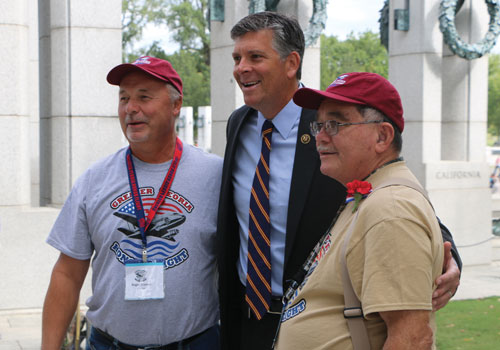
Born and raised in Peoria, Congressman Darin M. LaHood (R) has served Illinois' 18th Congressional District in the U.S. House of Representatives since winning a special election in September 2015. He previously served in the Illinois State Senate, spent nearly a decade as a state and federal prosecutor, and was both an assistant U.S. attorney in Las Vegas, Nevada, and assistant state’s attorney in Cook County and Tazewell County, in addition to practicing with the Peoria law firm of Miller, Hall & Triggs. LaHood earned his B.A. from Loras College and holds a J.D. from The John Marshall Law School. He and his wife, Kristen, live in Dunlap and are the parents of three sons: McKay, Lucas and Teddy.
How did your experiences in the Illinois Senate and as a state and federal prosecutor help prepare you to serve in the U.S. Congress?
Working in the Illinois State Senate solidified my conviction on the need for fiscal responsibility, transparency, ethics, accountability to the voters and good constituent service—matters which I continue to champion in my new role. My ten years as a state and federal prosecutor helped shape the way I approach public policy. For example, when national conversations surface on terrorism, violent crime, immigration and gun control, I have seen firsthand how those laws are enforced in the courtroom and how they affect people and our society. Being a prosecutor also exposed me to the ways that we can improve our criminal justice system by enacting systematic, common-sense reforms.
What did you learn during your first year in Congress?
Coming to Congress in a special election, I had a lot to learn my first year. I learned that when you stay grounded to your district, listen to your constituents and their needs, and focus on building relationships and reaching across the aisle, you can accomplish important things.
Last spring, I hosted four roundtables throughout my district to understand how the heroin and opioid epidemic was impacting families and communities in central Illinois. After healthcare providers, treatment specialists, first responders and law enforcement officials shared the need for a coordinated and urgent response, I took their ideas back to Washington and helped pass the Comprehensive Addiction and Recovery Act, signed by the President, to direct resources to support those on the frontlines of this public health crisis.

I have a unique opportunity and significant capability to help people, and it was very fulfilling to experience that this past year. In addition to our policy achievements, we responded to well over 1,500 requests for assistance with federal agencies. We’ve helped widows receive their Social Security payments, veterans get access to necessary healthcare, immigrants become U.S. citizens, taxpayers get their refunds from the IRS, and even helped a war hero receive his Purple Heart. I look forward to continuing to serve the people of the 18th District to the best of my ability.
The 18th District spans 19 counties and more than 700,000 residents. How do you stay connected to the needs of such a diverse constituency?
Staying connected is my primary focus, and it dominates my calendar. In my district, I’ve attended 252 meetings and events, and hosted 20 roundtable discussions on pressing matters facing communities. I’ve also sent over 35,000 letters answering constituent questions, and been in touch with more than 148,000 constituents through telephone town halls. I enjoy regularly updating my constituents on Facebook and Twitter. It’s a lot of work, but it’s my job to be this district’s voice in Washington, and that requires a lot of communication. Thankfully, technology helps me keep in touch. I’m able to send out e-newsletters updating constituents on activity in Congress and the district. I also quickly get a sense of where people stand on issues from flash polls I send out and correspondence we receive. I take all that into consideration when I make decisions.
As a congressman and Cabinet member, your father was well known for his focus on bipartisanship, yet partisan dysfunction is far worse today than it was even a few years ago. Do you believe this problem can be fixed?
I came to Congress focused on restoring accountability and responsiveness to the American people. As a freshman, I have seen the dysfunction in Washington firsthand this past year, but sadly, this partisanship has stretched for decades, regardless of which party has been in control. However, I am hopeful that the atmosphere in Washington can change. We’ve seen our country unify after deep divisions in the past, and I am confident that we can rise above partisanship to meet the significant demands we face.
Central Illinois has produced leaders that have done just that: President Abraham Lincoln, former Senate Minority Leader Everett Dirksen, President Ronald Reagan and former House Minority Leader Bob Michel. If they did it, we can too. True change requires a bottom-up initiative in Congress. It can’t just be rhetoric or a top-down approach. True change requires reforms in the way Congress operates to maximize accountability to the American people. Ultimately, that means more work for Congress.
 You recently introduced legislation that would take steps to reform Congress. What are some specific elements that you believe should be part of any reform package?
You recently introduced legislation that would take steps to reform Congress. What are some specific elements that you believe should be part of any reform package?
Rep. Dan Lipinski and I introduced a bill calling for the formation of a Joint Committee to reform Congress and restore it as an institution that delivers results to the American people. Congress cannot restore confidence in itself and improve the political process without an extraordinary legislative procedure such as a Joint Committee. This bipartisan, bicameral joint committee would be composed of 12 members from the Senate and 12 members from the House, with equal numbers of Republicans and Democrats, charged with bringing transformational reforms to Congress in order to make it more functional and effective. Congress created three of these joint committees in the 20th century to propose reforms… and it’s time for another one.
I believe there is room to improve the budgetary process and return power from unelected bureaucrats in agencies back to representatives in Congress, the first branch of government. There are many ideas out there—ranging from reforming the appropriations process and the committee structure, to increasing accountability and responsiveness to the public—and the Joint Committee’s role would be to evaluate them all. Our bill provides a mechanism to consider these reform ideas.
In recent years, technology and globalization have fundamentally rewritten the “rules” of the economy, while many citizens do not possess the proper skills or training to secure the jobs of the future. What should be the government’s role in helping them prepare for the workforce?
I am a strong supporter of diversifying and strengthening educational opportunities, including career and technical education and STEM programs to help more Americans gain the skills they need to compete for high-skilled, in-demand jobs. However, education won’t help if our economy continues to crawl along and businesses cannot hire. Creating jobs and growing the economy is my top priority in Congress, and to do that, the government needs to streamline regulations, simplify the tax code and expand trade.
Did you know that small businesses are America’s number-one job creator? However, in 2015, regulations cost us $1.89 trillion in lost productivity and growth [Competitive Enterprise Institute, 2016]. We must cut back on regulations so small businesses can employ more people. We also need to streamline our complex and outdated tax code to remain globally competitive. America has the highest corporate tax rate in the developed world, and it hasn’t been updated since 1986. I also believe that by expanding free and fair trade, our farmers and manufacturers, like Caterpillar, can expand their markets and hire more people.
Donald Trump’s populist campaign was notable for its rejection of Republican orthodoxy on a range of issues. How do you believe the party will evolve to accommodate the concerns of the millions of people who feel left behind by the modern economy?
Trump electrified a demographic of Americans who are justifiably frustrated and fed up with the direction America is headed. Under the current administration, the past eight years have resulted in an economy that is essentially stagnant, that is overburdened to meet continuous demands from Washington, and that has left record amounts of people unemployed and underemployed. Although there may be some minor differences, we agree with President-elect Trump far more than we disagree with him, and House Republicans are eager to work with him to turn the economy around and get people back on their feet. In the past year, House Republicans have rolled out an agenda called the “Better Way Agenda,” which clearly outlines the top issues the House will address in the next year, from tax reform to healthcare reform. We look forward to working with President-elect Trump to address the problems facing our country.
We have witnessed unprecedented levels of incendiary rhetoric in the 2016 presidential campaign. What can Congress do to help the country heal after such a divisive and vicious campaign?
Get to work. The election is behind us, and the American people have spoken. It’s time for Congress to deliver results and solve the issues people feel are most important to them. We know the economy is sluggish and our national debt has doubled over the last eight years. The American public wants some assurance that middle-class Americans will have more opportunities to prosper than they have had in the past decade.

Immigration reform played a key role in the presidential campaign. Many experts say that building a wall on the Mexican border is not cost-effective or feasible—nor is mass deportation. How can we address this issue in a way that maintains national security and our long history as a “melting pot” for immigrants of all nationalities, ethnicities and religious identities?
Trump has put forth many bold statements on immigration, but we both agree we need to secure the border, tighten the screening process and enforce rule of law. Our nation is facing a significant terrorist threat, and that cannot be ignored. ISIS has transcended the borders of nation-states, and we need to properly screen all who enter our country from locations where violent and radicalized Islamic groups have an influence. In addition, there are a number of proposals to enhance border security, such as providing ICE officers with all the resources they need to diminish the threat of drugs, weapons and undocumented immigrants from entering the United States. America is a nation of immigrants and welcomes those who want to come and build a better life for themselves and their families. But people who aren’t playing by the rules shouldn’t be allowed to cut in line in front of the people who are respecting the law. We must streamline the process for people to enter our country legally.
Across the nation, roads and bridges are in need of significant investment. What is the likelihood of a major infrastructure bill in 2017, and what do you think should be the key elements of such a bill?
Transportation is of fundamental importance to our economy—it moves goods, services, commodities and agricultural products throughout our nation and to global markets. In my district, our roads, bridges, locks and dams transport crops and livestock from our farmers and equipment manufactured by companies like Caterpillar to their customers. I was privileged that Speaker Paul Ryan appointed me to serve on the FAST Act Conference Committee just months after being elected in 2015. I collaborated with fellow members of Congress to compose and pass a bipartisan, comprehensive measure that will improve both Illinois’ economy and transportation system while increasing state and local control. This fully-funded, five-year agreement provides certainty to our road builders and users through FY 2020. President-elect Trump recognizes the importance of our nation’s transportation system, and I look forward to working with him on creating ways to revitalize and expand our nation’s infrastructure.
What is your long-term vision for your political career? What do you most want to be remembered for?
First and foremost, it is an honor and a privilege to serve the citizens of the 18th Congressional District. I believe that being a member of Congress is ultimately about being a strong public servant. My vision is to serve as a representative to build a better future for my three sons, for my community, for my state and for my country. The vast majority of citizens are people who work hard, play by the rules and have a strong faith in God. I’m focused on being a strong advocate for the issues and concerns facing my constituents, staying grounded to the district, voting the right way and providing strong constituent service. If I do those things to the best of my ability, this district will be well represented. iBi

